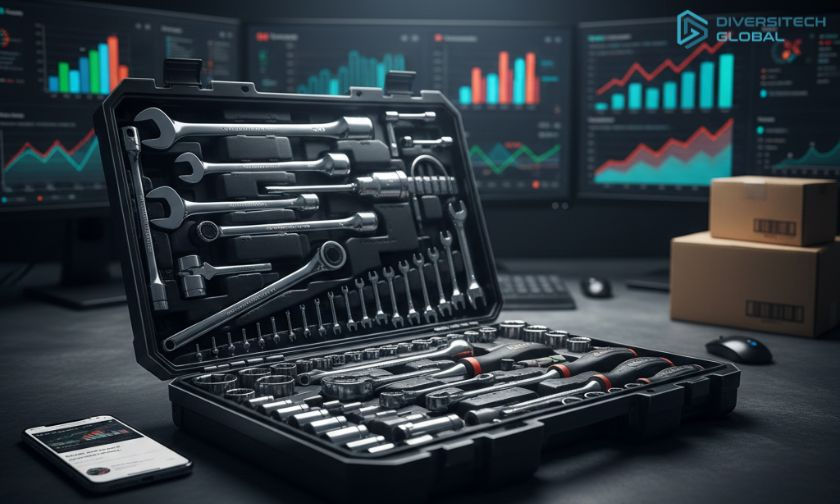A Guide to Finding Sustainable Garden Tools: Brands to Consider
- Diversitech Global

- May 27, 2024
- 7 min read
Updated: Jun 3, 2024

In today's world, where environmental consciousness is becoming increasingly important, sustainable practices are key in every aspect of our lives, including gardening. One often overlooked aspect of sustainability in gardening is the tools we use. By choosing sustainable garden tools, we can reduce our environmental impact and contribute to a healthier planet.
In this guide, we will explore the importance of sustainable garden tools, the benefits they offer, and how to identify and choose the best options. We will also highlight some top brands that use any of the top Garden Tools Manufacturer in China to prioritize sustainability in their gardening tools, helping you make informed choices for a greener garden.
Related Article: Sustainable Garden Tool Manufacturers Guide
Understanding Sustainability in Gardening Tools
Sustainability is a term that is often used when discussing environmental practices, but what does it mean in the context of gardening tools? Understanding the principles of sustainability in gardening tools is essential to make informed choices and minimize our ecological impact. In this section, we will explore the concept of sustainability in gardening tools and its significance.
What is Sustainability in Gardening Tools?
Sustainability, in the context of gardening tools, refers to the ability of these tools to minimize their negative impact on the environment throughout their lifecycle. It involves considering the materials used, manufacturing processes, energy consumption, and end-of-life disposal. Sustainable garden tools are designed to be durable, efficient, and environmentally friendly, with a focus on reducing waste, conserving resources, and promoting ecological balance.
Key Features of Sustainable Garden Tools
Durable Materials: Sustainable garden tools are often made from high-quality, long-lasting materials such as stainless steel, bamboo, or recycled plastics. These materials are chosen for their durability and ability to withstand frequent use without compromising their functionality.
Energy-Efficient Manufacturing: Sustainable Garden tool manufacturers prioritize energy-efficient manufacturing processes. This includes using renewable energy sources, reducing waste during production, and implementing efficient technologies to minimize energy consumption.
Minimal Environmental Impact: Sustainable garden tools are designed to have minimal impact on the environment. This includes using non-toxic materials, avoiding harmful chemicals in coatings or treatments, and minimizing carbon emissions during production and transportation.
Ergonomic Design: Sustainable garden tools often feature ergonomic designs that prioritize user comfort and reduce strain on the body. This not only enhances the gardening experience but also promotes long-term use and reduces the need for frequent replacements.
Repairability and Recyclability: Sustainable Garden tools are designed with repairability and recyclability in mind. They are often constructed in a way that allows for easy repairs or replacement of individual parts, extending their lifespan. Additionally, at the end of their useful life, these tools are designed to be easily recyclable, reducing waste and promoting a circular economy.
The Importance of Sustainable Gardening Practices
Choosing sustainable garden tools is just one aspect of adopting a sustainable gardening approach. By using tools that align with sustainable practices, gardeners can contribute to a healthier environment in several ways:
Preserving Natural Resources: Sustainable garden tools reduce the demand for new resources by utilizing durable materials and promoting long-term use. This helps conserve natural resources such as timber, metals, and fossil fuels.
Minimizing Waste: By choosing tools that are repairable and recyclable, gardeners can significantly reduce the amount of waste sent to landfills. This not only reduces the environmental impact but also saves money in the long run.
Promoting Biodiversity: Sustainable gardening practices, including the use of sustainable tools, can help preserve and enhance biodiversity. By avoiding harmful chemicals and reducing pollution, gardeners create a healthier environment for plants, insects, and wildlife.
Inspiring Others: By adopting sustainable gardening practices and using sustainable tools, gardeners can inspire others to do the same. This ripple effect can lead to a collective effort in creating a greener and more sustainable future.
Understanding sustainability in gardening tools is the first step towards making conscious choices that benefit both your garden and the environment. In the next section, we will explore why it is important to choose sustainable garden tools over traditional options.
Related Article: Latest Trends in Garden Tools Market
Identifying Sustainable Garden Tools
Identifying sustainable garden tools can sometimes be challenging, as there are numerous options available on the market. However, by considering specific factors such as materials, certifications, and company sustainability policies, you can make informed choices. In this section, we will explore how to identify and choose sustainable garden tools effectively.
Materials to Look For
Recycled Materials: Sustainable garden tools often utilize recycled materials, such as recycled plastic or reclaimed wood. These materials reduce the demand for new resources and help divert waste from landfills.
Sustainable Wood: If wooden tools are your preference, look for those made from sustainably sourced wood. This means the wood is harvested from responsibly managed forests that prioritize biodiversity, soil health, and long-term sustainability.
Stainless Steel: Stainless steel is a durable and long-lasting material commonly used in sustainable garden tools. It is resistant to rust and corrosion, ensuring longevity and reducing the need for replacements.
Bamboo: Bamboo is another sustainable material often used in garden tools. It is fast-growing, renewable, and has excellent strength and durability. Look for tools made from sustainably harvested bamboo.
Certifications and Labels
Forest Stewardship Council (FSC): The FSC certification ensures that wood products, including garden tools, come from responsibly managed forests. Look for the FSC label on wooden tools to ensure their sustainability.
USDA Organic: While primarily associated with food, the USDA Organic label can also be found on gardening tools, particularly those made from organic materials or using environmentally friendly manufacturing processes. This certification guarantees that the tools meet strict organic standards.
Cradle to Cradle (C2C) Certification: The Cradle to Cradle certification assesses the entire lifecycle of a product, including its materials, manufacturing processes, and recyclability. Tools with this certification are designed with the goal of achieving circularity, where they can be recycled or repurposed at the end of their life.
Company Sustainability Policies
When choosing sustainable garden tools, it is essential to consider the sustainability policies of the companies producing them. Look for brands that prioritize environmental stewardship, ethical sourcing, and social responsibility. Some key factors to consider include:
Use of Renewable Energy: Companies that invest in renewable energy sources, such as solar or wind power, demonstrate their commitment to reducing carbon emissions.
Waste Reduction Practices: Look for companies that implement waste reduction strategies, such as recycling programs, waste minimization, and packaging made from recycled materials.
Ethical Labor Practices: Companies that prioritize fair labor practices, including safe working conditions and fair wages, demonstrate their commitment to sustainability beyond just environmental considerations.
Transparent Supply Chain: Brands that have transparent supply chains and can trace the origin of their materials and manufacturing processes are more likely to prioritize sustainability.
By considering the materials used, certifications, and company sustainability policies, you can make educated choices when selecting sustainable garden tools. In the next section, we will explore some top brands that are known for their commitment to sustainability in gardening tools.
Related Article: Guide to Sourcing China-Made Garden Tools
Top Brands for Sustainable Garden Tools
Amid growing environmental concerns and the push towards sustainability, many top brands have made significant strides in producing eco-friendly garden tools. These brands are not only committed to reducing their carbon footprint but also to providing high-quality, durable tools that cater to both professional gardeners and DIY enthusiasts. This section explores some of the leading brands in the sustainable garden tools market.
Diversitech Global is a leading China-based manufacturer renowned for its high-quality hand and power tools, including a wide range of garden hand tool sets.
Extensive Experience: With over 20 years of industry experience, Diversitech Global has produced over 30 million tools for companies worldwide, ensuring top-tier quality and innovation.
Customized OEM Solutions: Diversitech offers fully customized OEM toolkit solutions, catering to the specific needs of suppliers, purchasers, and retailers. Their expertise spans product design, development, manufacturing, and packaging.
Versatile Product Range: From shovels to pruning shears, Diversitech's comprehensive range of garden tools is designed to meet the diverse needs of both amateur gardeners and professional landscapers. Their products are built to withstand rigorous use, delivering reliable performance consistently.
Fiskars is a renowned Finnish company known for its commitment to sustainability and innovation in garden tools.
Sustainable Materials: Fiskars utilizes recycled and sustainably sourced materials in its products. For example, their handles often use recycled plastic or composite materials, reducing reliance on virgin plastics.
Durability and Repairability: Designed for longevity, Fiskars tools are built to last, which reduces the frequency of replacement and waste. They also offer repair parts for many of their tools, supporting a circular economy model.
Eco-Friendly Operations: Fiskars has implemented energy-efficient manufacturing processes and aims for low emissions and waste. Their commitment to sustainability is reflected in their corporate responsibility reports and certifications.
Husqvarna, a leading Swedish manufacturer, combines advanced technology with eco-friendly practices to produce high-quality garden tools.
Battery-Powered Tools: One of Husqvarna’s key contributions to sustainability is its range of battery-powered garden tools. These tools offer reduced emissions and noise levels compared to traditional gas-powered equipment.
Sustainable Manufacturing: Husqvarna prioritizes sustainable manufacturing practices, including the use of renewable energy sources and minimizing waste in production processes.
Environmental Stewardship: The company participates in various environmental initiatives, such as reforestation projects and recycling programs, reinforcing its commitment to the environment.
Gardena, a German company, is well-known for its innovative and environmentally friendly garden tools.
Water-Saving Products: Gardena specializes in smart water management systems that help reduce water usage. Their drip irrigation and moisture-sensing technology ensure efficient water use in gardens.
Recyclable Materials: Gardena focuses on using recyclable and low-impact materials in its products, ensuring that their tools have a minimal environmental footprint.
Energy-Efficient Operations: The company employs energy-efficient manufacturing techniques and participates in sustainability initiatives, such as reducing CO2 emissions and promoting biodiversity.
Greenworks is a prominent brand dedicated to providing eco-friendly garden tools powered by electric and battery technology.
Electric and Battery Solutions: Greenworks offers a wide range of electric and battery-powered garden tools, eliminating the need for gasoline and significantly reducing emissions.
Zero Emissions Commitment: By focusing solely on electric-powered tools, Greenworks ensures that their products contribute to cleaner air and quieter operation, enhancing user experience while protecting the environment.
Sustainable Packaging: Greenworks uses recyclable and minimalistic packaging to reduce waste and environmental impact.
Related Article: Garden Tools' Different Types and Uses
Elevate Your Garden with Sustainable Choices
Choosing sustainable garden tools from these top brands not only helps protect the environment but also ensures that you have reliable, high-performance gardening equipment for your customer's needs. By prioritizing eco-friendly materials, innovative technologies, and sustainable manufacturing practices, brands like Fiskars, Husqvarna, Gardena, and Greenworks lead the way in making gardening a greener and more sustainable activity. Investing in their products allows you to cultivate your garden responsibly, contributing to a healthier planet while enjoying the benefits of advanced garden tools.
Related Article: The Right Garden Tools Factory for Your Business Needs




I’m so glad to see sustainable garden tools getting the attention they deserve—it’s something I’ve been trying to prioritize in my own gardening. Choosing eco-friendly brands makes me feel like I’m caring for my plants and the planet at the same time. One of the reasons I want reliable tools is to plant early spring flowers from GrowCycle’s recommendations, since they need careful handling during the cooler months. Combining sustainable tools with vibrant spring blooms feels like the perfect way to create a garden that’s beautiful and responsible, and it’s exciting to see more options for making gardening greener!